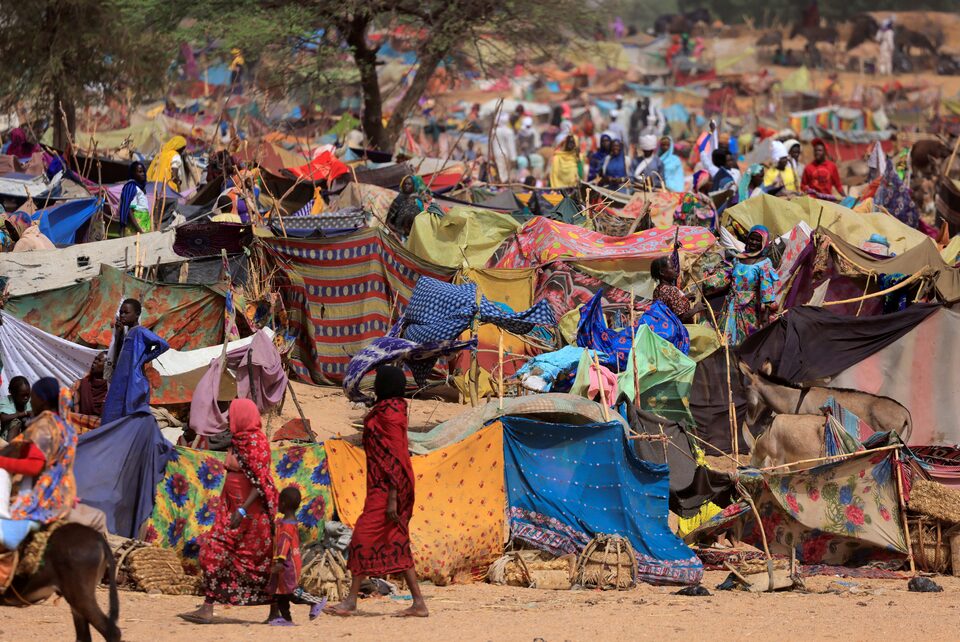
Chad Urgently Needs Support with Sudanese Refugees
Sudanese Refugee Crisis Strains Chad’s Resources
Chad is currently facing an urgent refugee crisis as it becomes the primary destination for hundreds of thousands of people fleeing the ongoing conflict in Sudan. The Sudanese refugee crisis is overwhelming Chad, one of the poorest nations in the world, and urgently requires international support. As Sudan’s internal strife intensifies, Chad’s already limited resources are stretched thin, and the country is struggling to provide basic necessities for the displaced.
Why Chad is the Main Refugee Destination
The Sudanese refugee crisis has forced thousands of people to cross into Chad, seeking safety from the escalating violence in Sudan. The conflict, which has been intensifying since April 2023, has led to widespread displacement within Sudan. As of recent reports, nearly 400,000 people have fled into neighboring countries, with Chad bearing the brunt of this influx.
Chad’s proximity to Sudan and its historical ties with the country make it a natural destination for Sudanese refugees. However, Chad’s infrastructure, health systems, and economy are ill-equipped to handle such a massive influx of displaced people. This situation has created a dire humanitarian crisis that requires urgent international intervention.
The Impact of the Refugee Influx on Chad’s Resources
Chad, already ranked as one of the world’s least developed nations, is facing immense pressure to support its own population while accommodating refugees. The government, which has limited resources, is working hard to provide food, shelter, healthcare, and basic services to the Sudanese refugees, but the sheer scale of the crisis is overwhelming.
Chad’s refugee camps, which are located along the border, are overcrowded and lack essential resources such as clean water, sanitation, and medical facilities. In addition to the logistical challenges, the country’s already fragile economy is struggling to absorb the costs associated with the refugee crisis.
International Support and Humanitarian Aid
In response to the crisis, humanitarian organizations such as the United Nations High Commissioner for Refugees (UNHCR), the World Food Programme (WFP), and Doctors Without Borders (MSF) have mobilized to assist Chad. However, these organizations are also facing their own resource limitations and are calling for more international aid to help mitigate the situation.
The international community has been urged to step up its efforts to support Chad in providing for the refugees. Funding for humanitarian aid is urgently needed to ensure that refugees receive adequate shelter, food, and healthcare. While international donors have pledged support, much more is required to address the full scope of the crisis.
Chad’s Challenges in Hosting Refugees
Chad’s efforts to provide for the refugees have been hampered by several challenges. One major issue is the lack of sufficient infrastructure. Chad’s health system is underdeveloped, and the country struggles to provide adequate medical care, especially in rural areas where most refugees are settling. The influx of refugees has led to a rise in preventable diseases, including cholera and malaria, which have further strained the country’s limited healthcare resources.
Another challenge is the economic impact of hosting such a large number of refugees. Chad’s economy is heavily dependent on agriculture and natural resources, and it has been hit hard by fluctuations in global oil prices and regional instability. The refugee crisis has added an additional burden to the country’s already fragile economy, making it more difficult for Chad to provide for both its citizens and the refugees.
How the U.S. and Other Countries Can Help
The international community must play a critical role in supporting Chad’s efforts to manage the refugee crisis. The United States, European Union, and other countries with the capacity to assist must step up their financial and logistical support for Chad. This includes increasing funding for humanitarian aid, providing medical supplies, and facilitating the relocation of refugees to other safe countries if necessary.
Moreover, diplomatic pressure should be exerted on Sudanese authorities to bring an end to the violence and allow for peaceful resolution in the region. The longer the conflict in Sudan continues, the more refugees will pour into neighboring countries like Chad, making it essential for the international community to push for peace.
The Role of Local Communities in Assisting Refugees
While international organizations and governments play a crucial role in providing support, local communities in Chad have also stepped up to help refugees. Many Chadians are offering shelter, food, and assistance to their neighbors from Sudan, despite the hardships they themselves face.
These local efforts are critical in providing immediate relief, but they need to be supported by greater institutional and financial backing. By partnering with local communities, humanitarian organizations can maximize their impact and ensure that aid reaches the most vulnerable populations.
The Long-Term Solution: Sustainable Refugee Management
While the immediate focus is on providing humanitarian aid, it is also essential to think about long-term solutions for the Sudanese refugee crisis in Chad. One key aspect of this is the creation of sustainable refugee settlements that offer education, employment opportunities, and integration programs to help refugees rebuild their lives.
In addition, long-term development assistance is needed to help Chad strengthen its own economy and infrastructure, making it better equipped to handle future crises. By investing in Chad’s future, the international community can help mitigate the strain on its resources and create a more stable environment for both refugees and host communities.
Conclusion: A Global Responsibility to Address the Sudanese Refugee Crisis
The Sudanese refugee crisis in Chad is a critical humanitarian issue that requires urgent and sustained international support. Chad, a country already grappling with poverty and limited resources, is doing its best to accommodate the large influx of refugees. However, without increased international assistance, the situation will continue to worsen, putting both refugees and Chadian citizens at risk.
To prevent further suffering, global actors must come together to provide immediate relief and work towards long-term solutions that address the root causes of the conflict in Sudan. By doing so, they can help ensure that the refugees are not only safe but also have the opportunity to rebuild their lives in a more stable and secure environment.
External Links:
FAQs
- Why are refugees fleeing Sudan?
Refugees are fleeing Sudan due to ongoing conflict between government forces and rebel groups, resulting in widespread violence and instability. - How many Sudanese refugees are in Chad?
Nearly 400,000 refugees have fled into Chad, significantly impacting the country’s resources. - What challenges does Chad face in hosting refugees?
Chad faces challenges including overcrowded refugee camps, lack of infrastructure, limited healthcare, and economic difficulties. - What international organizations are helping Chad?
The UNHCR, World Food Programme, and Doctors Without Borders are among the organizations providing aid to Chad. - How can the U.S. help Chad?
The U.S. can provide increased financial support for humanitarian aid, medical supplies, and peace efforts. - What role do local communities play in supporting refugees?
Local communities in Chad are offering shelter and assistance to refugees, helping to address immediate needs. - What is the long-term solution to this crisis?
Sustainable refugee management, development assistance for Chad, and a peaceful resolution to the conflict in Sudan are necessary for long-term stability. - How can the international community help resolve the conflict in Sudan?
Diplomatic pressure on Sudanese authorities to end the conflict and allow peaceful negotiations is essential. - What are the immediate needs of Sudanese refugees?
The immediate needs include food, clean water, shelter, healthcare, and sanitation services. - What impact is the refugee crisis having on Chad’s economy?
The refugee crisis is further straining Chad’s fragile economy, which relies heavily on agriculture and natural resources.
Image credit – REUTERS/Zohra Bensemra



1 thought on “Chad Urgently Needs Support with Sudanese Refugees”
Comments are closed.